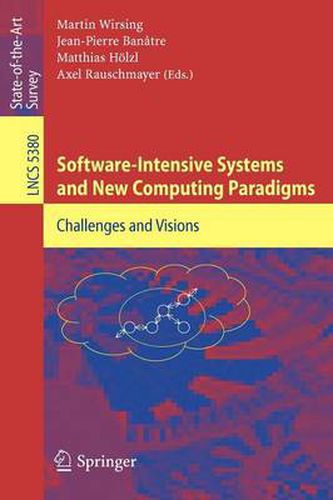Readings Newsletter
Become a Readings Member to make your shopping experience even easier.
Sign in or sign up for free!
You’re not far away from qualifying for FREE standard shipping within Australia
You’ve qualified for FREE standard shipping within Australia
The cart is loading…






This title is printed to order. This book may have been self-published. If so, we cannot guarantee the quality of the content. In the main most books will have gone through the editing process however some may not. We therefore suggest that you be aware of this before ordering this book. If in doubt check either the author or publisher’s details as we are unable to accept any returns unless they are faulty. Please contact us if you have any questions.
Software-intensive systems have become increasingly important for a multitude of products and services from all sectors of the economy, our national and - ternational infrastructure, and our daily lives. The ongoing decrease in size and cost of microprocessorsandstoragedevicesis leading to the development of ever more distributed and decentralized systems. Systems are assembled as dynamic federationsofautonomousandevolvingcomponents insteadof monolithicapp- cations, they perform tasks of staggering complexity with continuously cha- ing requirements and in a permanently evolving environment. In the near - ture novel technologies will allow the construction of systems with millions of nodes,and systems will be likely to containsubsystems basedonnew computing paradigms such as molecular computing. To identify these emergent trends, their impact on the information society in the next 10-15 years, and the challenges they present to computing, software engineering, cognition and intelligence, the European Commission has estab- 1 lished two Coordinated Actions: initially the project Beyond the Horizon 2 and then, starting in 2006, the project InterLink . Both projects are coor- nated by the European Research Consortium for Informatics and Mathematics (ERCIM EEIG) and funded by the Future and Emerging Technologies (FET) Unit of the European Commission. The ongoing project InterLink is composed of three thematic working groups: software-intensive systems and new comp- ingparadigms;ambientcomputingandcommunicationenvironments;intelligent and cognitive systems. This volume presents the results of the working group on software-intensive systemsandnovelcomputing paradigms.Theobjectivewasto imaginethela- scape in which the next generations of software-intensive systems will operate.
$9.00 standard shipping within Australia
FREE standard shipping within Australia for orders over $100.00
Express & International shipping calculated at checkout
This title is printed to order. This book may have been self-published. If so, we cannot guarantee the quality of the content. In the main most books will have gone through the editing process however some may not. We therefore suggest that you be aware of this before ordering this book. If in doubt check either the author or publisher’s details as we are unable to accept any returns unless they are faulty. Please contact us if you have any questions.
Software-intensive systems have become increasingly important for a multitude of products and services from all sectors of the economy, our national and - ternational infrastructure, and our daily lives. The ongoing decrease in size and cost of microprocessorsandstoragedevicesis leading to the development of ever more distributed and decentralized systems. Systems are assembled as dynamic federationsofautonomousandevolvingcomponents insteadof monolithicapp- cations, they perform tasks of staggering complexity with continuously cha- ing requirements and in a permanently evolving environment. In the near - ture novel technologies will allow the construction of systems with millions of nodes,and systems will be likely to containsubsystems basedonnew computing paradigms such as molecular computing. To identify these emergent trends, their impact on the information society in the next 10-15 years, and the challenges they present to computing, software engineering, cognition and intelligence, the European Commission has estab- 1 lished two Coordinated Actions: initially the project Beyond the Horizon 2 and then, starting in 2006, the project InterLink . Both projects are coor- nated by the European Research Consortium for Informatics and Mathematics (ERCIM EEIG) and funded by the Future and Emerging Technologies (FET) Unit of the European Commission. The ongoing project InterLink is composed of three thematic working groups: software-intensive systems and new comp- ingparadigms;ambientcomputingandcommunicationenvironments;intelligent and cognitive systems. This volume presents the results of the working group on software-intensive systemsandnovelcomputing paradigms.Theobjectivewasto imaginethela- scape in which the next generations of software-intensive systems will operate.